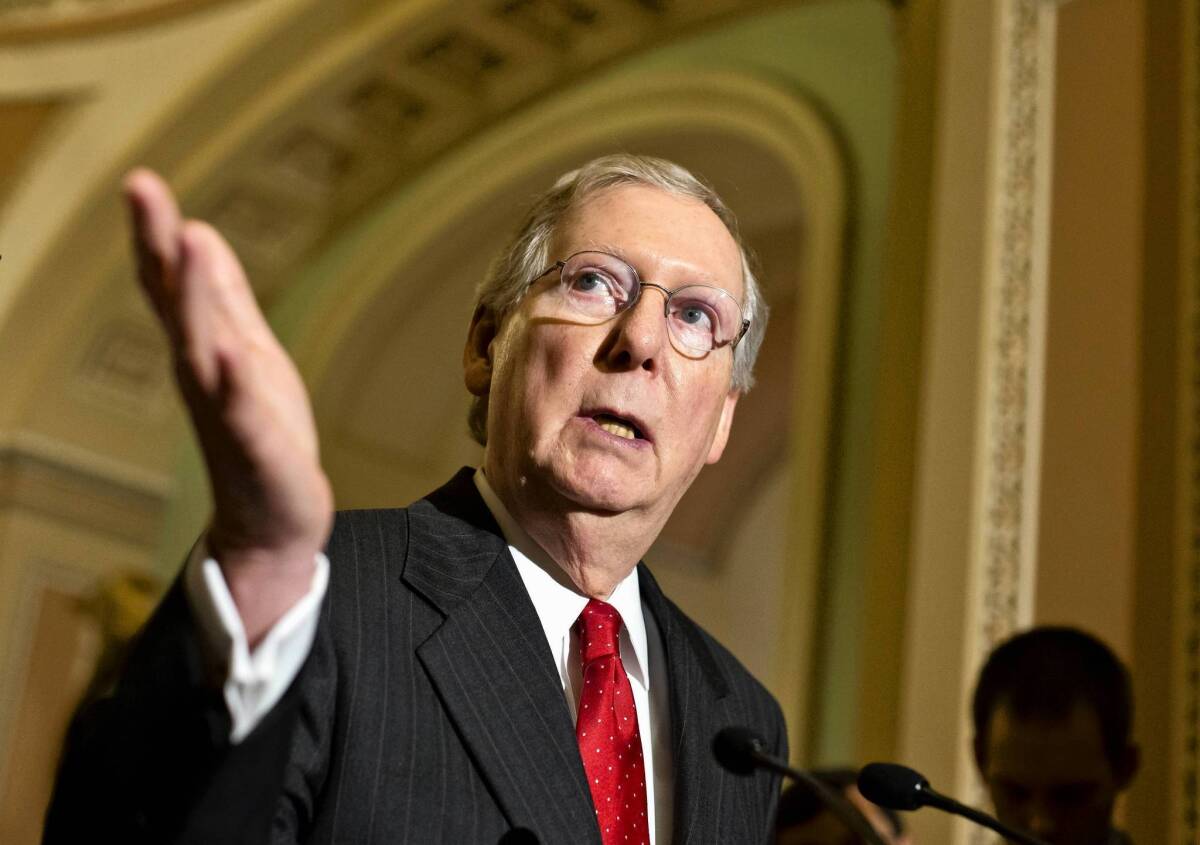Senate filibuster rule could face reckoning next week

WASHINGTON — Fed up with Republican efforts to block confirmation of President Obama’s appointees, Democrats threatened Thursday to limit use of the filibuster, a drastic maneuver that would end an age-old Senate tradition and could inflame tensions between the two parties.
Senate Majority Leader Harry Reid set the stage for a showdown next week, scheduling votes on seven stalled nominations that require 60 votes to advance under a filibuster. If those votes fail, Reid vowed that Democrats would alter Senate rules on executive branch nominations to allow them to pass on majority votes.
“This is about making Washington work regardless of who’s the president,” the Nevada Democrat said in a heated debate that consumed the day. “The constant obstruction in this chamber has gone on long enough.”
The Senate’s GOP leader, Mitch McConnell, bitterly protested Reid’s threat, saying it would be “one of the most consequential changes to the United States Senate in the history of our nation.” The Kentucky senator charged that Democrats wanted to replace the Senate’s mandate of “advise and consent” with “sit down and shut up.”
Republicans warned that use of the so-called nuclear option would lead them to shut down the Senate for the rest of the congressional term and make the filibuster the centerpiece of their campaign in next year’s election.
“If Sen. Reid changes the character of the Senate, then the Senate ceases to function,” said Sen. Lamar Alexander (R-Tenn.). “We’ll take our case to the people, we’ll argue for a new majority, and then Republicans will be in a position to do whatever Republicans with 51 votes want to do.”
At the heart of the dispute are the president’s unconfirmed choices to lead the Labor Department and Environmental Protection Agency and, more significant for Democrats, long-delayed nominees to lead the Consumer Financial Protection Bureau and fill posts on the National Labor Relations Board.
Reid said the GOP’s delaying tactics, which he characterized as unprecedented, began with the first-ever filibuster of a nominee to lead the Defense Department, former Nebraska Sen. Chuck Hagel, a Republican.
The fight echoes one from 2005. Then, Republicans had the Senate majority and Democrats were blocking several of President George W. Bush’s judicial nominees. The dispute sparked similar threats to alter the filibuster, but with the roles reversed.
The impasse ended when 14 senators negotiated a compromise. Just five of them remain. A majority of the chamber, including 33 of the 54 Democrats and independents, joined after that dust-up was resolved.
Democrats charge that Republicans went back on an agreement earlier this year to approve executive branch nominations in an orderly manner. Instead, they say, Republicans have besieged nominees with questionnaires and used their leverage over the administration to make excessive demands on federal agencies.
“It’s galling that these positions are going unfilled, not because Republicans object to the nominees but because, simply, they don’t like the agency and don’t want it to function,” said Sen. Charles E. Schumer (D-N.Y.). “That’s not right, that’s not fair; we have an obligation to stop or it’ll only get worse.”
The American people “know the Senate hasn’t worked,” Reid said. “We need to do something to change that.”
McConnell, who traded charges with his Democratic counterpart on the Senate floor, said Reid was manufacturing a crisis to appease the Democratic Party’s labor allies and liberal base. He noted that every Cabinet nomination that had been brought to the Senate floor had been confirmed.
“This is no small matter,” he said of Reid’s threat. “And I guarantee you it’s a decision that, if they actually go through with it, they will live to regret.”
Reid said he had the support of his caucus to enact rule changes that would allow the Democrats to confirm appointments with a simple majority, rather than the 60-vote threshold.
To change the rules, Reid needs just a majority vote. He needs all but four of the Democrats and independents to reach that threshold. Vice President Joe Biden would be available to provide a 51st vote if necessary, said Sen. Tom Udall (D-N.M.), one of a newer crop of Democrats who have pushed for more filibuster reform.
“We’ve got to govern. We were elected. The president was elected. He’s got to have his team in place,” Udall said. “Let’s not let the tyranny of the minority continue.”
Two senior Democrats — Michigan’s Carl Levin and Iowa’s Tom Harkin — signaled they were wary of rewriting the rules with the session underway. “You’re changing the rules in the middle. And once you start down that road … that’s not good,” Harkin said. “Having said that, I may have to get over that.”
In the midst of Thursday’s angry rhetoric, some senators called for a rare closed-door meeting in the historic Old Senate Chamber to air grievances and seek a resolution.
Reid scheduled a private session for Monday night, but even that led to a protest from McConnell, who noted that attendance tends to be spotty on the first day of the week.
More to Read
Start your day right
Sign up for Essential California for news, features and recommendations from the L.A. Times and beyond in your inbox six days a week.
You may occasionally receive promotional content from the Los Angeles Times.







